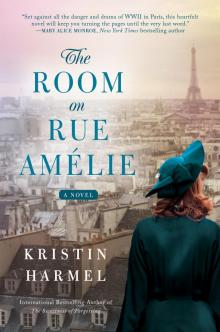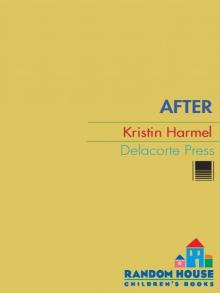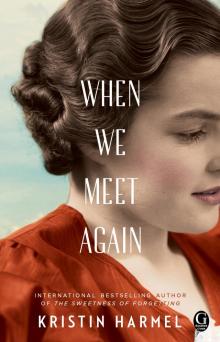- Home
- Kristin Harmel
The Winemaker's Wife Page 5
The Winemaker's Wife Read online
Page 5
“It will be all right, Inès,” Michel said over his shoulder as the man hustled him away with Klaebisch following close behind. Inès thought she saw the hint of a smile on Michel’s face for an instant, but then it was gone.
“Please!” Inès called after the weinführer. “He is innocent!”
Klaebisch turned to face her, his face etched with exhaustion. “Madame,” he said, “none of us are innocent anymore.”
In the end, Michel spent just three days in prison in Reims, and he described it afterward as a jolly affair, for the cells were full of winemakers who had been arrested for the same offense.
“Inès,” Michel said on the night he returned to the Maison Chauveau, dark circles under his eyes. “You should have seen it. It made me proud to be Champenois.”
Inès led Michel to the bedroom, and as she slowly unbuttoned his shirt and pulled him toward her, thanking God that he’d made it home safely, she murmured, “But now that you’ve stood your ground, you can go back to making bottles normally, right? You’ve made your point, I think, my darling.”
She leaned in to kiss him, but he pulled away. “Inès, this is only the beginning.”
She stared at him. What had happened to his talk of remaining passive? “But, darling, you’re playing with fire.”
“Yes,” Michel said, his eyes glimmering with something dangerous. “And what was it General de Gaulle said? ‘Whatever happens, the flame of French resistance must not and shall not die.’ This is our country, my dear, and I will fight for its honor to the end.”
seven
JULY 1941
CÉLINE
On the second Thursday in July, Theo and Michel left one morning to attend the annual meeting of the Syndicat Général des Vignerons, the union of winemakers, twenty kilometers south, in Épernay. There was word that Maurice Doyard, who represented the region’s growers, had an announcement to make, along with Robert-Jean de Vogüé from Maison Moët & Chandon, who represented the champagne houses.
“De Vogüé has some ideas for how to stand up to the Germans without getting ourselves in trouble,” Theo told Céline on his way out the door.
“I hope he’s not advocating anything dangerous,” Céline said.
“I think it is more a matter of figuring out how to deal with Klaebisch as effectively as possible.”
That made Céline feel a bit better, but she knew she wouldn’t relax until Theo and Michel had returned. She kissed Theo goodbye, a perfunctory peck on the lips, and headed for the cellars as the men drove off in Michel’s Citroën.
Below, Inès was already pulling out barrels from a storage cave and rolling them into the main hall. Since the previous week, inspecting and preparing the barrels for the upcoming harvest had been her main task, an assignment Michel had given her because it kept her busy and took little finesse or skill. Céline hoped that Inès didn’t realize this was her husband’s logic. As the war had dragged on, forcing them together, Céline had begun to feel a bit sorry for Inès, who did seem to be trying to pitch in. Céline couldn’t imagine they would ever truly be friends—Inès was flighty and seemed not to grasp the magnitude of the war at their doorstep—but Céline knew she needed to try harder to be pleasant to the other woman. A sense of lonely desperation seemed to swirl around Inès these days, and at the very least, Céline understood how that felt.
“Where are we?” asked Céline as she approached the storage cave.
Inès wiped her brow; her left cheek was streaked with dirt, her forehead glistening with sweat. “I’m just beginning with these. I’m putting the barrels that need extra attention in the empty cave over there to the left.”
“Good.” Céline tied her hair back and eyed the barrels Inès had already rolled out. “Shall I start with the ones you filled yesterday?” Each day of the inspections, they had to first knock on the barrels to make sure that the echo didn’t sound dull. If it did, the barrel was likely compromised. If the echo pinged instead, as it was supposed to, the barrels were rolled into a cave, where they were washed out and filled with a bit of water. If the water was still there the next day, the barrel was flipped over, to check that the other end was structurally sound, too. It was vital to do this with every barrel, because if any of them had cracked or warped, a great deal of wine could be lost. It was in these vessels that the first fermentation would take place before the wines were moved to bottles to ferment for a second time.
“All right.” Inès bent to a barrel and knocked on the top. She then tapped her knuckles down the length of the wood in several places and nodded in approval.
“Here, I’ll get that one,” Céline said, taking the barrel from Inès and turning it onto its side to roll it. “I’m headed back anyhow.”
“Thank you.” Inès reached for another barrel. “So where did you learn so many steps of winemaking, anyhow? I’ve always wondered.”
“Oh, I’ve been working with wine since I was young. You remember that my father is a winemaker, yes?” Saying the words made Céline’s heart ache, for she still hadn’t heard from him. With every day that passed, she grew more and more worried.
Inès nodded. “So he taught you to make wine before you married Theo?”
“Long before.” Silence fell again, and Céline knew she should be trying harder to be pleasant. She forced herself to add, “That’s how Theo and I met, actually. Through my father.”
“I never knew that.”
“Theo apprenticed with my father for a short time to learn how to make sparkling wine. My father is fairly well known in Burgundy for the vin mousseux he produces each year.” Céline started down the hall with the barrel. “My father could see how talented he was, and he knew Theo aspired to come to Champagne,” she added over her shoulder. “I suppose you could say my father orchestrated things between us. He felt Theo had a bright future ahead of him and that he could give me a better life than I would have in Burgundy.”
“So you and Theo started to date?” Inès was following Céline down the hall, her eyes wide with curiosity. “And then you fell in love?”
Céline moved the barrel into a storage cave and righted it before answering. “We married quickly, actually, before we really knew each other at all, because Theo was already making plans to leave Burgundy. The union made sense, you see. I was the daughter of a winemaker, and I understood what it would be like to have a life that revolved around wine. And for Theo, I think being married felt like a bit of a relief. He didn’t have to worry about courting anyone; he could focus only on his work.”
“You didn’t marry for love?” Inès looked devastated. “That’s so sad.”
Céline felt a small surge of annoyance. Did the other woman really think that finding that sort of romance was commonplace? No, love was something you had to work for, and Céline had tried hard over the years. “We love each other now,” she answered simply, though she wasn’t entirely certain the words were true. The passage of time had only revealed how little they had in common.
“But . . .” Inès said before trailing off with a perplexed expression.
“Honestly, Inès, we’re not all as lucky as you and Michel,” Céline said. She regretted her tone as hurt flashed across Inès’s face, and she tried to soften her words by adding, “I’m only saying that you’re fortunate to have fallen in love with someone who fell in love with you, too, right from the start.” It had been hard to watch, actually. Céline had always respected Michel, and at times, especially when Theo withdrew into himself to brood about wine production, she had felt a connection with him that startled her. But then he had fallen head over heels for a skinny, gorgeous whirlwind, and Céline had been a bit disappointed. She had always imagined he would marry someone a bit more solid and serious, perhaps someone more like her, someone she could have imagined a true friendship with.
“Yes.” Inès went silent, and Céline thought the conversation was over until Inès added in a small voice, “But sometimes I wonder if Michel fell in love only with the idea o
f me. Like he looked at me and saw what he wanted me to be, but he has been disappointed by the reality.”
“I’m sure that’s not the case.”
“Isn’t it?” Inès let out a small, ragged sigh. “It seems I can’t do anything right anymore. I can see it in his eyes.”
“It’s just the war. There’s a lot weighing on him.” Though Céline felt sorry for Inès, she understood Michel’s frustration. He had too much on his shoulders to have to coddle her, though certainly he had seemed eager to do just that when he first brought her home and installed her in the house like a beautiful decoration.
“I know. But that’s why I wish he’d trust me to help more. The way he trusts you.”
The edge to Inès’s voice was unmistakable, but the fact was, Michel and Theo had given Inès several chances. Most recently, they had been desperate for assistance with the disgorgement—popping the sediment out of bottles that had already gone through the riddling process—and they had taught both Céline and Inès how to do it. It was tricky; they had to grab an upside-down bottle and tilt it upright while watching the bubble of gas rise inside. At the second the bubble reached the sediment collected in the neck, they had to snap the cap off with a metal tool called a pince à dégorger before quickly plugging the bottle with a thumb. Céline had gotten the hang of it after about three dozen attempts, but they’d had to stop Inès after a hundred or so bottles, because instead of waiting for the bubble of gas inside, it appeared she was simply popping caps at whim, which resulted in far too much wine spilled onto the cave floors.
“Well, you are helping now,” Céline said.
Inès sniffed. “Yes, well, anyone can knock on wood and fill barrels with water, right?”
Céline forced a small smile. “It is still useful.”
“Yes.” Inès’s tone was flat. “That’s just what Michel says.”
They lapsed into silence and worked together for the next few hours without exchanging more than a handful of sentences about where to put the barrels, or what time the men might return.
It was nearly seven o’clock when they heard the rumble of the Citroën aboveground. A moment later, Michel came down the winding stairs. Theo was just behind him, smiling.
“How did it go?” Céline asked, looking up from a barrel and brushing off her hands.
“Wonderfully,” Theo replied, and for the first time in months, Céline saw hope in his eyes. “The intention is to have Klaebisch deal with an organization that represents all of us rather than approaching us individually. That way, we all share the burden in a manner that is fair.”
“Well, that sounds like the perfect solution!” Inès exclaimed brightly, clapping her hands.
Michel frowned at his wife. “Well, it is a step in the right direction,” he said carefully. “But we have also received word that Klaebisch is now requisitioning five hundred thousand bottles a week from Champagne.”
“Five hundred thousand?” Céline asked. “How will we keep up with that? If this year’s harvest is down, too . . .”
Theo glanced at her. “But this will keep them from breathing down our necks for the more valuable vintages. Trust me, Céline, this is a good thing. The industry is going to survive. It will all be okay.”
Michel cleared his throat, and as Céline looked up to meet his eye, she wondered if he was thinking, as she was, that Theo seemed to be missing the point. The war was about far more than whether their wine survived.
“Well, the new arrangement should certainly help, anyhow,” Michel said. He looked once more at Céline, and he held her gaze for a split second before turning back to the others. “In any case, let’s see how the barrel inspection is coming along.”
• • •
That night, Theo pulled Céline close as soon as she climbed into bed beside him. She was startled to feel her body stiffen in response, and she forced herself to relax.
“Champagne will survive this.” Theo stroked her cheek, his hand rough. She couldn’t remember the last time he had touched her this way, and it felt strange, unfamiliar. “The meeting today, Céline, well, it is the first time I’ve felt that there’s truly a solution of some sort,” he added. “De Vogüé is a wise man.”
“Yes.”
“He will take care of us. The wine will be all right.” He touched her face again, moved his hips into hers.
She bit her lip but couldn’t stop herself from blurting out, “But what about the people? Is it only about the wine for you?”
She could feel him go still, and when he rolled onto his back, opening up a gulf between them, she closed her eyes in the darkness, already angry at herself. He didn’t share her fears, and though she was aware of that, forcing the words to the surface could do no good.
“Of course not,” he snapped. “But you should care about the wine, too. It is our life, Céline.”
“No, Theo. It is the thing we do, not who we are. If the Germans destroyed the vineyards tomorrow, we would find a way to go on. But what if they destroy my family? What if they already have?”
“Céline, come now. Your family, they are safe. It will all be fine. You will see.”
“You can’t know that.” Céline could see her father’s face in her mind, could feel her grandfather’s strong hand on her shoulder, could feel her grandmother’s warm lips pressed against her cheek. Suddenly, she couldn’t be beside Theo any longer. Without another word, she scrambled out of bed and headed for the bedroom door, pausing only long enough to grab the long sweater that was draped over the chair in the corner.
“Céline, you’re being dramatic. Where are you going?”
“I need some air.” She made her way in the darkness to the back door of the house, half expecting Theo to follow her, to apologize for his lack of understanding, but he didn’t, and she supposed that said a lot.
Outside, the moon was nearly full, illuminating everything. Céline headed for the cellars. She would be alone with the sleeping bottles, and she knew that would bring her peace. Theo didn’t believe that she cared about the wine, but she did—deeply. She could feel the hearts and souls of the workers in every bottle. It was just that she cared about their actual lives more.
The inky black darkness belowground felt like an embrace. At the foot of the stone stairs, Céline lit an oil lamp, and the walls around her came alive with familiar shadows. She inhaled deeply and then froze. There was a slight scratching sound in one of the caves ahead and to the right. Was someone there? She stood perfectly still, her heart pounding.
Of course, the smart thing to do would be to turn around and head back aboveground, extinguish her light, hurry back home. But a sudden defensiveness swept over her; the Germans could impose their rules and requisition their bottles, but this hallowed place beneath the earth could never belong to them. It belonged to France, all the years of history that had unfolded here, the way the very earth had wrapped itself around the aging wine and turned it into something magical. Before she could stop herself, she slipped off her shoes and walked as quietly as possible down the narrow passage.
The cellars had gone silent, and Céline told herself that perhaps the sound she’d heard had come from a mouse. Still, she moved forward cautiously, illuminating the first cave to the right. What would she do if she found a German lurking in the darkness? But there was nothing there, nothing but thousands of sleeping bottles.
The next cave held no movement either, and she was just about to shine her light into the third when a voice cut through the darkness.
“Céline?”
She let out a strangled scream before realizing that it was Michel standing several feet in front of her, his eyes wide. “My God, you scared me to death.” She put a hand over her heart. “What are you doing down here?”
“I couldn’t sleep,” he said. “I come down here sometimes when I need to think.”
“So do I.” Céline looked up at him, alarmed. “I mean, I hope that’s all right. I realize these are your cellars . . .”
“Céline, this place is as much yours as it is mine. After all you and Theo have done, all the time you’ve invested here.” He shook his head. “You could have gone south, tried to find a safer place to wait out the war, and you stayed.”
“Of course we stayed.” Céline didn’t know quite how to put it, but she felt rooted here, like she had found the place she was meant to be. She and Theo had never even talked about leaving.
“Well, I am grateful.” He gestured into the cave he’d just emerged from. “Now that you’re here, would you like to sit for a while? I could use the company.”
Céline hesitated. She knew she should probably go back upstairs, leave Michel to his thoughts. That would be the polite thing to do, the appropriate thing. But there was something about Michel’s expression, the softness in his eyes, that made her want to stay. “I should—” she began.
“Please,” he interrupted. “I would like very much to ask you something.”
Céline hesitated before following him into the cave, goose bumps prickling her skin. He gestured to the stone bench along the back wall, and she sat at the far end, leaving plenty of room for him to settle on the other side. Still, when they faced each other in the darkness, the moment felt suddenly intimate. He must have sensed it, too, for he leaned away immediately.
“Is everything all right?” she asked when he still hadn’t spoken.
“What? Oh, yes, yes.” He raked a hand through his hair, and she noticed how tired he looked, how worn. Of course they all looked like that these days, but there was something about Michel that seemed different to her, a sadness to his eyes. She wondered if he could see her emotions as clearly as she could see his.
“You said there was something you wanted to ask?”
“Yes. And please forgive me if my inquiry is too personal, but . . .” He trailed off and raked his fingers through his hair again. “I wanted to ask about your family.”

 The Room on Rue Amélie
The Room on Rue Amélie The Winemaker's Wife
The Winemaker's Wife The Forest of Vanishing Stars
The Forest of Vanishing Stars The Book of Lost Names
The Book of Lost Names Italian for Beginners
Italian for Beginners After
After How to Save a Life
How to Save a Life The Blonde Theory
The Blonde Theory The Sweetness of Forgetting
The Sweetness of Forgetting When We Meet Again
When We Meet Again Life Intended (9781476754178)
Life Intended (9781476754178)